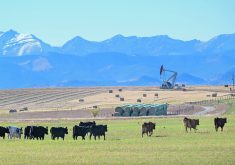Fundraising has begun on what could eventually be a $2.4 billion renewable diesel and canola crushing megaproject in Regina.
The City of Regina has committed $1 million for the front-end engineering and design phase of a project being spearheaded by True North Renewable Fuels Ltd., a Calgary energy company formed in 2018.
The firm needed that commitment to trigger another $5 million in funding from Agriculture Canada’s Agricultural Clean Technology Program.
The remaining $15 million for the study will come from True North.
The plan is to build a renewable diesel facility capable of producing one billion litres of the fuel per year, which amounts to about 20,000 barrels a day.
Read Also

Saskatchewan dairy farm breeds international champion
A Saskatchewan bred cow made history at the 2025 World Dairy Expo in Madison, Wisconsin, when she was named grand champion in the five-year-old Holstein class.
Renewable diesel is an advanced form of biodiesel.
“This is actually a direct replacement for fossil fuel,” said True North chief executive officer Douglas Cole.
“You can burn it at 100 percent in some applications.”
The plan is to use canola oil as the feedstock for the plant, but it could use soy oil, animal fats and used cooking oil. The plant would require one million tonnes of canola oil per year.
“That’s in excess of two million tonnes of seed,” said Bernie McClean, chair of the Saskatchewan Canola Development Commission.
“Nice. That’s almost the size of the Japanese export market.”
He is pumped about the prospect of a renewable diesel project of that magnitude being built in the province.
Any time there is the chance for more canola to head to a homegrown market is a good thing because domestic demand is more stable than overseas sales.
“There can’t be non-tariff trade barriers. That’s a plus,” said McClean.
“Two years ago when China shut the door on Richardson and Viterra, that really highlighted how exposed we were.”
He was shocked to hear about the project because there has been no mention of it around the SaskCanola and Canola Council of Canada board tables.
Cole said the True North business plan hinges on Canada’s proposed Clean Fuel Standard creating a huge market for renewable diesel, just like California’s Low Carbon Fuel Standard has done south of the border.
“We’d be the first of its type in Canada,” said Cole.
Cole and his business partner, Brian Adolph, have decades of experience in the upstream oil and gas industry.
The company has been working with Economic Development Regina and Protein Industries Canada to create a mega-project that would expand the scope of the project beyond the renewable diesel plant to include a canola crush facility.
“Their concept is an agricultural value-added complex, which would not only include the crushing but the potential for protein extraction as well,” he said.
Regina radio station CJME is reporting that the total value of the complex would be $2.4 billion.
Cole said True North would be responsible only for building the renewable diesel plant. The crush facility and protein extraction plant would be built by another firm.
“We’re in discussions with a number of companies. At this stage of the game all of those conversations are done under confidentiality agreements,” he said.
To put the scope of the project in perspective, Richardson International’s Yorkton, Sask., crush plant cost $170 million to build.
Richardson’s crush plants in Yorkton and Lethbridge, Alta., combined process 1.6 million tonnes of canola a year, producing 700,000 tonnes of oil annually.
The proposed Regina crush facility would produce one million tonnes of oil annually.
“It would be a big facility,” said Cole.
The protein extraction plant would produce a feed product for the aquaculture industry.
Cole said Regina is the ideal location for the megaproject because there is plenty of locally grown canola, not a lot of nearby crush competition and exceptional access to railways.
From a renewable diesel perspective, Regina would be able to service markets in Ontario and British Columbia without triggering an increase in life-cycle carbon intensity metrics.
McClean joked that his only reservation with the proposed location is that it isn’t close enough to his farm in Glaslyn, Sask.
Contact sean.pratt@producer.com
















